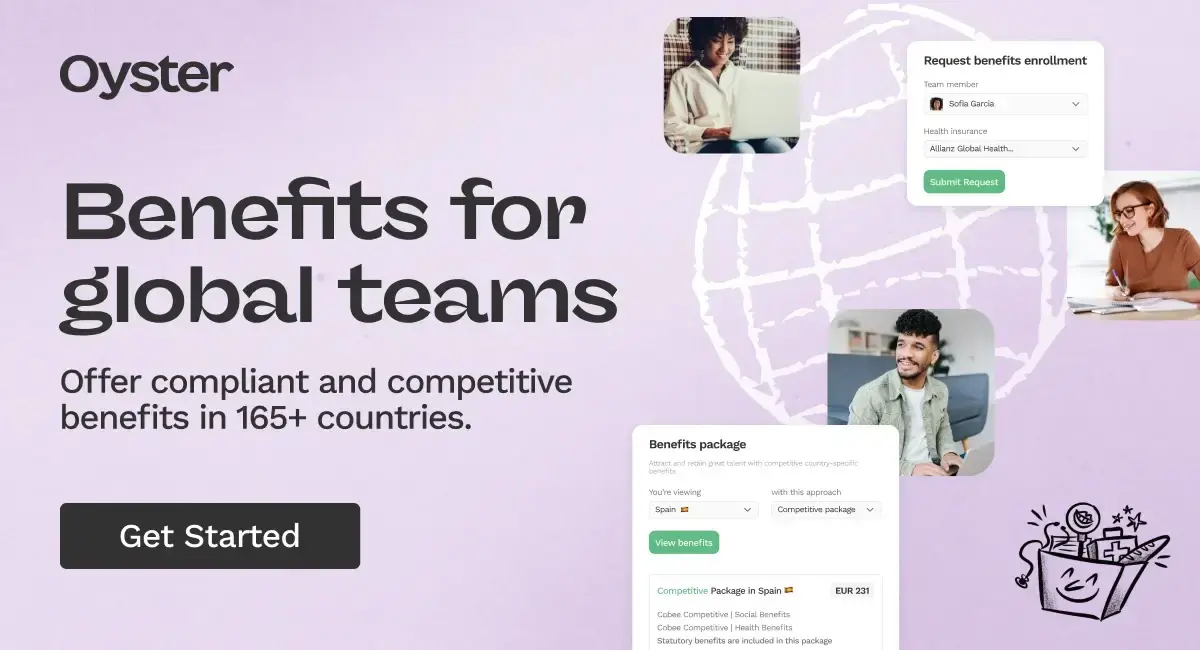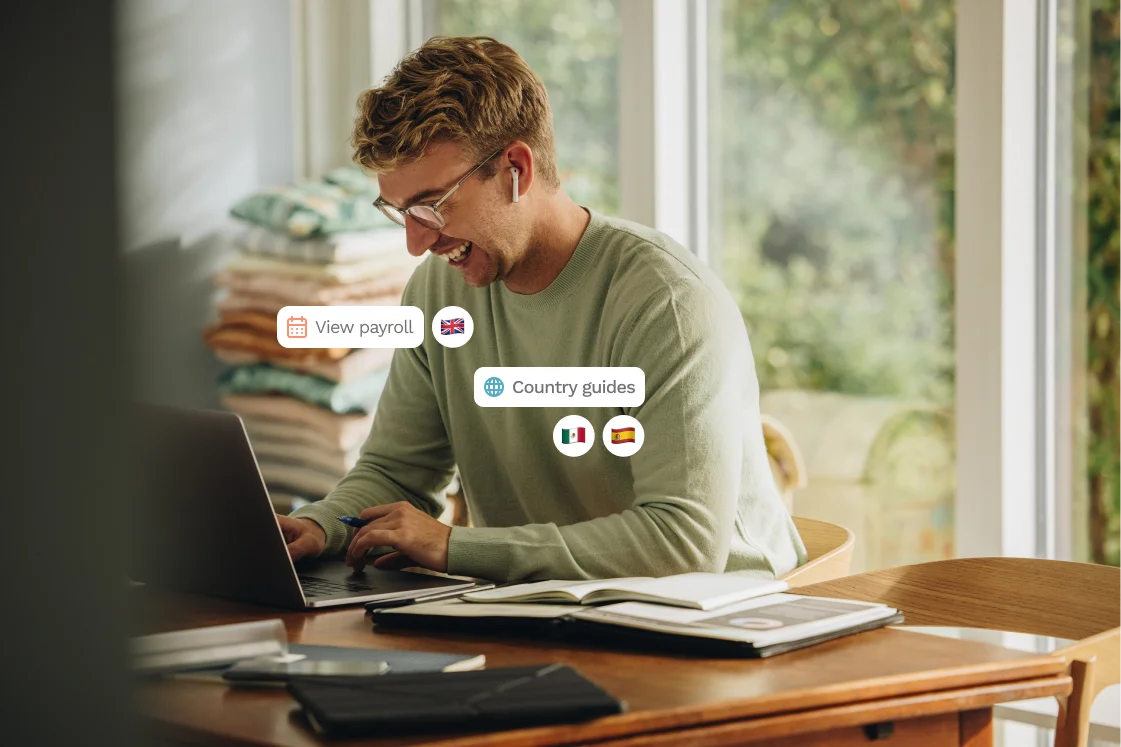Offering health insurance can be challenging for small and mid-sized companies. Premiums rise every year, compliance rules vary by state, and negotiating with carriers takes time many leaders don't have. Still, health benefits remain a decisive factor for candidates comparing offers and employees deciding whether to stay.
PEO health insurance makes it possible to offer competitive plans without shouldering the burden alone. By partnering with a professional employer organization (PEO), companies can access the same type of large-group health plans bigger organizations provide. That means stronger coverage options and less work for your People team.
Discover what a PEO is in insurance, how the partnership works, and how it can boost your benefits strategy.
The importance of offering health insurance benefits
Health insurance shapes how your company is perceived, impacting your ability to satisfy, retain, and attract talent. Here are a few reasons why it creates a competitive benefits package.
Improves recruitment and retention
Both current and future staff prioritize health benefits. PeopleKeep's 2024 Employee Benefit Survey found 81% of workers consider an employer’s benefits package an important factor in whether they accept a job, and 76% of employees participate in health insurance.
Many leaders recognize this significance—the Society for Human Resource Management (SHRM) annual survey shows about 88% of employers consider health-related benefits “very important” or “extremely important” for their team.
Supports employee well-being and productivity
While health coverage protects against sudden costs, it’s more than a financial safety net. Regular access to medical care, preventive services, and mental health resources can help employees stay healthier over the long term. That translates into fewer sick days and a workforce better equipped for high performance.
Strengthens your overall benefits package
Making health insurance a part of your core offering shows your company takes employee needs seriously, boosting your total compensation package. This is especially true for small business benefits—a human-centric focus makes you an attractive employer, even if the total package is less comprehensive than offerings from more established companies.
What does a PEO do? Understanding PEO health insurance
PEO plans are group insurance policies provided through a PEO. When you sign up, the organization adds your team members to their benefits group. This lets smaller businesses access coverage and rates usually reserved for larger organizations.
Businesses enter into a co-employment relationship with the PEO for benefits and payroll administration. The organization pools employees from all its client companies, and because of this larger pool, they’re able to negotiate lower premiums and broader coverage with insurance providers. Your employees gain access to those plans, often including medical, dental, and wellness programs.
Beyond coverage, PEOs also handle some health insurance paperwork, managing enrollment, claims processing, and compliance. This reduces your team’s workload, letting them focus on strategy rather than renewals and daily administration. This time and cost savings is a major advantage of PEO services compared to alternatives like outsourcing or in-house management.
Benefits of using a PEO service for group health insurance
Working with a PEO changes how small and mid-sized companies deliver benefits, making health coverage more affordable and easier to manage. Here are four of the main advantages.
1. Enables cost savings through pooled plans
Due to their size and influence, small businesses often struggle to negotiate affordable premiums on their own. These companies have reduced risk-sharing and limited bargaining power, which typically increase costs. A PEO health plan pools employees from many organizations together, giving your company access to the same group insurance plans available to large businesses.
2. Reduces administrative burden and compliance risk
Traditional employer-sponsored health insurance involves a lot of manual effort, including renewals, regulatory requirements, and Affordable Care Act compliance. A PEO shares those responsibilities, lifting a major weight off of People teams and reducing the need for extensive in-house services.
3. Improved employee engagement and retention
Robust healthcare options signal your organization values health and well-being. PEOs make it easier to access top-notch benefits, regardless of company size. With this high-quality coverage, employees are more likely to stay longer, feel supported, and connect with their work.
4. Access to additional perks beyond health coverage
Many of the best PEOs for health insurance don’t stop at fundamentals like medical, dental, and vision. They often bundle in extras, including life insurance and employee assistance programs. Without a co-employment agreement, these perks would normally be difficult or too expensive to secure for small businesses.
Alternatives to PEO health insurance
While PEO services are a great choice for many businesses, you may need something different depending on your goals. Here are a few alternatives.
Health Reimbursement Arrangements (HRAs)
An HRA is an IRS-approved benefit that allows employers to set aside pre-tax funds to reimburse employees for healthcare expenses. Businesses define a monthly allowance, and staff purchase their preferred plans. These arrangements have multiple options, like the Qualified Small Employer and the Individual Coverage HRAs. This gives companies flexibility in how much they contribute and allows team members to choose plans that fit their doctors and networks.
Direct small-group health insurance
Some companies choose to work directly with carriers or brokers to purchase a small group plan. While this often comes with higher premiums and more administrative responsibility, it can make sense for organizations who want to maintain full control over their benefits strategy.
Global employment platforms
For distributed and international teams, global employment platforms like Oyster offer a powerful alternative. They’re based on the employer of record (EOR) model, which legally employs workers on behalf of another business. Unlike a PEO, which requires the business to have a legal entity in the operating country and co-employs team members, an EOR acts as the sole employer for your international employees.
This arrangement allows businesses to recruit employees in new markets without the time and expense of setting up a local entity, and it shifts the full legal liability to the EOR provider.
Instead of limiting coverage to U.S.-based group plans, these platforms provide access to benefits worldwide. That makes it possible to support employees regardless of location and ensure consistency in your programs.
Offer global health benefits with Oyster
PEO services can work well for U.S.-based teams, but they fall short when your workforce is spread across multiple countries. With Oyster, you can deliver localized health benefits that meet compliance requirements in each country, or extend coverage with global plans that reach employees in more than 165 countries.
Oyster’s tiered packages let you choose the right level of coverage for your team. Employees gain access to essentials like medical, dental, and vision, plus additional perks like mental health and telehealth services. These plans let employers roll out benefits consistently and support their people without juggling multiple vendors or navigating unfamiliar regulations.
For globally distributed teams, Oyster makes benefit administration simple, scalable, and fair. That means stronger employee engagement and a benefits strategy that works anywhere in the world
Start offering global benefits today with Oyster.

About Oyster
Oyster is a global employment platform designed to enable visionary HR leaders to find, engage, pay, manage, develop, and take care of a thriving distributed workforce. Oyster lets growing companies give valued international team members the experience they deserve, without the usual headaches and expense.
Oyster enables hiring anywhere in the world—with reliable, compliant payroll, and great local benefits and perks.







